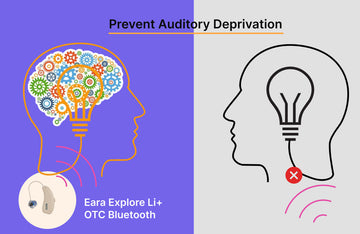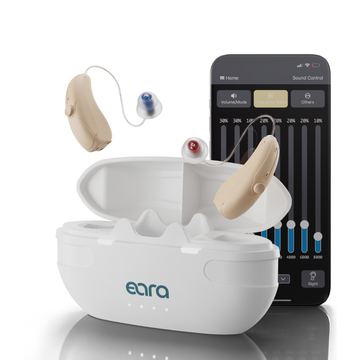Auditory deprivation occurs when the brain receives too little sound stimulation, often due to untreated hearing loss. Over time, this lack of input can cause the auditory regions of the brain to weaken or become reassigned to other functions, such as visual processing. It's similar to a muscle that isn’t used, without regular activity, it begins to shrink and lose strength.
This process can affect anyone, even those with mild hearing loss. The longer the brain goes without sound, the harder it becomes to process speech clearly, even after hearing is restored through aids or other interventions.
Why Early Intervention Matters
Hearing happens in the brain, not the ears. The ears collect sound and send it as electrical signals to the brain, which turns those signals into meaningful information: recognizing a voice or identifying an alarm. Even after someone starts using hearing aids, the ears may work well again, but the brain may struggle to make sense of what it’s receiving. It’s like fixing a microphone but playing audio through a damaged speaker. The signal is there, but the system that processes it isn’t working as expected.
This is why early intervention matters. The sooner hearing loss is treated, the better chance the brain has to stay active and responsive. Getting the right hearing aid, properly fitted and programmed to your needs, ensures the brain receives the sound input it needs to function well. A poor fit or incorrect settings can mean you’re still not getting enough sound stimulation, essentially leaving the problem unresolved.
That’s the reason we created Eara Explore Li+, an OTC Bluetooth hearing aid designed to offer accessibility and ongoing support. It comes with lifetime audiology consultation, so you're never left to navigate the journey alone. Having a professional by your side, especially during those first weeks of adjustment, can make all the difference.
However, even with a good fit, adapting to hearing aids can take time. Your brain may need days or even weeks to adjust to the sounds it had forgotten. That's why it's important to consult a professional throughout your journey, they can fine-tune your devices and help you stay on track. This is why Eara Hearing offers consultations with our audiology team, we know the importance of having a professional available.
To support the adjustment process, auditory training tools such as listening exercises, hearing apps, or even simply reading aloud while listening to an audiobook can help retrain your brain to recognize and process sounds more effectively. These methods can reinforce what hearing aids are trying to do and accelerate the adaptation phase.
Also, keep in mind that consistency matters. Taking regular "hearing aid holidays", periods when you choose not to wear your devices can slow your progress and may undo some of the improvements your brain is making. Wearing your hearing aids daily, even in quiet environments, helps keep your brain actively engaged with sound.
It’s normal to need a little help along the way. Take a look at our tips for getting used to hearing aids and how to choose a good hearing aid.
Is Auditory Deprivation Reversible?
In some cases, YES, the effects of auditory deprivation can be at least partially reversed. When someone starts using hearing aids after untreated hearing loss, their brain begins to receive sound input again. This helps stimulate the auditory system and can improve how the brain processes sounds and speech over time.
Hearing aids play a key role in this process. They give your brain the input it needs to stay active and engaged.
It’s important to note that researchers are still learning about how reversible auditory deprivation is. Some studies show improvement with consistent hearing aid use, especially when started early, but results aren’t guaranteed, and more research is needed to understand the long-term effects fully.
The bottom line? The sooner you treat hearing loss, the better your chances of keeping your brain and hearing sharp.
Auditory deprivation shows how important the right hearing aid is, Eara’s Explore Li+ is built to get that fit right. It begins with an in-app hearing test that customizes the hearing aid to your exact level of hearing loss. As your brain adapts, our lifetime audiology support ensures your hearing aids evolve with you, offering expert adjustments when you need them. With multiple listening modes, Explore Li+ helps you stay tuned in, whether you're in a quiet room, a bustling café, or out in nature.






















